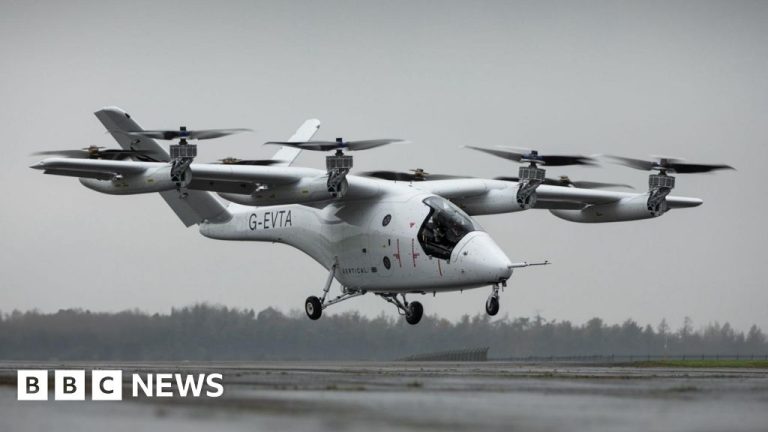Vertical Aerospace
Eight battery-powered rotors lift the plane during test flights at Cotswold Airport
A company developing a new electric plane has announced a major new investment, ensuring its survival.
Vertical Aerospace, based in Bristol, is testing a so-called electric flying taxi that can carry four passengers up to 100 miles (161 km).
The company was struggling financially but secured a $50m (£39m) investment from US investor Mudrick Capital.
Stuart Simpson, managing director of Vertical, called it a “truly exciting and pivotal day for the business”.
Vertical Aerospace
Vertical Aerospace employs around 350 people at its Bristol base
Vertical is one of several companies around the world trying to develop an all-electric vertical takeoff, or eVTOL, aircraft.
Its goal is to create an aircraft that is as practical as a helicopter but cheaper to operate, emitting no carbon and not contributing to climate change.
Vertical was founded in 2016 by British businessman Stephen Fitzpatrick, who also founded energy company Ovo.
Stephen Fitzpatrick says new plane will be 'safer, cheaper and greener'
Mr Fitzpatrick says the company's VX4 aircraft will be “100 times safer and quieter” than a helicopter, at a fifth of the cost.
Earlier this month, the company's engineers achieved another milestone at Cotswold Airport in Gloucestershire.
For the first time, they flew the plane “untethered”, without a safety line on the ground.
This is the next phase of their testing programme, overseen by the Civil Aviation Authority.
Mr Simpson said: “We are one of only two tilt-rotor flying taxis to have done this in the world, and we are doing it in the South West of England.
“It’s a phenomenal achievement.”
Vertical Aerospace
Stuart Simpson, Managing Director of Vertical Aerospace, is delighted with the progress being made
Providing carbon-free flights is something of a holy grail for the aerospace industry.
Airbus, GKN and other major aircraft manufacturers are experimenting with hydrogen-powered planes.
Another small startup is testing hydrogen fuel cells on small propeller-driven planes.
The vertical takeoff aircraft requires very sophisticated engineering.
Eight small rotors mounted on small wings initially lift the plane off the tarmac, like a helicopter.
They then tilt to propel the vehicle forward, providing more stability, but also more technical risks.
But finance is almost harder than physics.
It proved difficult to persuade investors to dig deep enough to get the company through long periods of testing and regulation.
Many businesses have already closed their doors.
American takeover?
Mr Simpson estimates that Jason Mudrick's $50m (£39) injection will keep Vertical operating until the end of 2025.
Vertical had accumulated £260m of debt and the new deal sees half of that debt converted into shares, held by distressed debt investor Mudrick Capital.
This means that Jason Mudrick will now own 70% of Vertical's shares, replacing founder Stephen Fitzpatrick, who owns 20%.
Mr Fitzpatrick will remain a member of the board, providing “strategic direction”.
Mudrick Capital has been involved for three years now and both parties have denied any takeover rumors.
Mr. Mudrick said: “This agreement underscores our appreciation of Vertical Aerospace’s position in the eVTOL sector and a team that has demonstrated its ability to deliver game-changing solutions for the future of sustainable aviation.
Mr Fitzpatrick said: “The additional equity and stronger balance sheet will enable us to finance the next phase of our development program and fulfill our mission of bringing this incredible electric aircraft into the sky. »
The company has already sold the first 1,500 aircraft to blue-chip aerospace companies and plans to achieve full CAA certification by 2028, which will give its aircraft clearance to fly.

